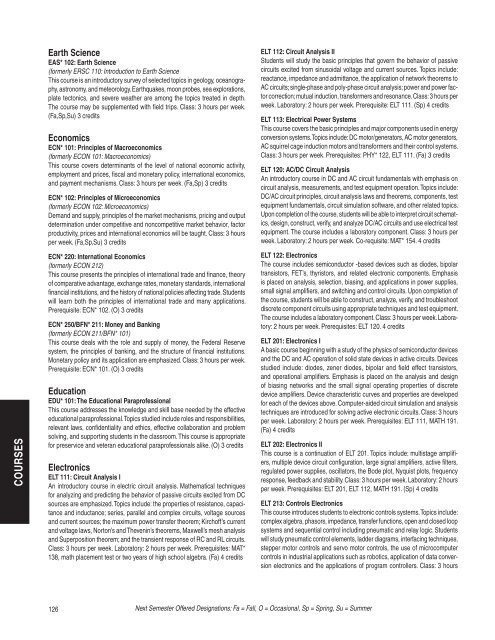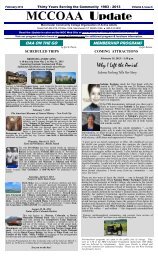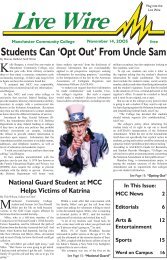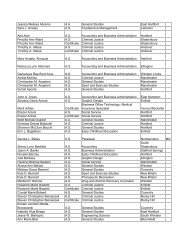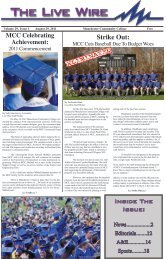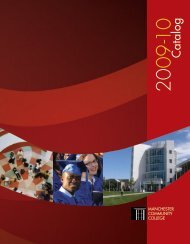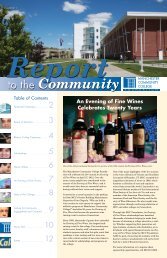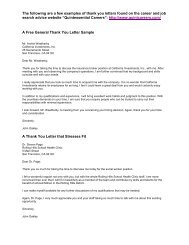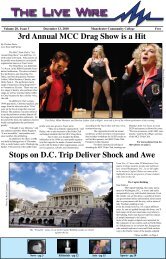Liberal Arts and Science - Manchester Community College ...
Liberal Arts and Science - Manchester Community College ...
Liberal Arts and Science - Manchester Community College ...
You also want an ePaper? Increase the reach of your titles
YUMPU automatically turns print PDFs into web optimized ePapers that Google loves.
COURSES<br />
Earth <strong>Science</strong><br />
EAS* 102: Earth <strong>Science</strong><br />
(formerly ERSC 110: Introduction to Earth <strong>Science</strong><br />
This course is an introductory survey of selected topics in geology, oceanography,<br />
astronomy, <strong>and</strong> meteorology. Earthquakes, moon probes, sea explorations,<br />
plate tectonics, <strong>and</strong> severe weather are among the topics treated in depth.<br />
The course may be supplemented with field trips. Class: 3 hours per week.<br />
(Fa,Sp,Su) 3 credits<br />
Economics<br />
ECN* 101: Principles of Macroeconomics<br />
(formerly ECON 101: Macroeconomics)<br />
This course covers determinants of the level of national economic activity,<br />
employment <strong>and</strong> prices, fiscal <strong>and</strong> monetary policy, international economics,<br />
<strong>and</strong> payment mechanisms. Class: 3 hours per week. (Fa,Sp) 3 credits<br />
ECN* 102: Principles of Microeconomics<br />
(formerly ECON 102: Microeconomics)<br />
Dem<strong>and</strong> <strong>and</strong> supply, principles of the market mechanisms, pricing <strong>and</strong> output<br />
determination under competitive <strong>and</strong> noncompetitive market behavior, factor<br />
productivity, prices <strong>and</strong> international economics will be taught. Class: 3 hours<br />
per week. (Fa,Sp,Su) 3 credits<br />
ECN* 220: International Economics<br />
(formerly ECON 212)<br />
This course presents the principles of international trade <strong>and</strong> finance, theory<br />
of comparative advantage, exchange rates, monetary st<strong>and</strong>ards, international<br />
financial institutions, <strong>and</strong> the history of national policies affecting trade. Students<br />
will learn both the principles of international trade <strong>and</strong> many applications.<br />
Prerequisite: ECN* 102. (O) 3 credits<br />
ECN* 250/BFN* 211: Money <strong>and</strong> Banking<br />
(formerly ECON 211/BFN* 101)<br />
This course deals with the role <strong>and</strong> supply of money, the Federal Reserve<br />
system, the principles of banking, <strong>and</strong> the structure of financial institutions.<br />
Monetary policy <strong>and</strong> its application are emphasized. Class: 3 hours per week.<br />
Prerequisite: ECN* 101. (O) 3 credits<br />
Education<br />
EDU* 101: The Educational Paraprofessional<br />
This course addresses the knowledge <strong>and</strong> skill base needed by the effective<br />
educational paraprofessional. Topics studied include roles <strong>and</strong> responsibilities,<br />
relevant laws, confidentiality <strong>and</strong> ethics, effective collaboration <strong>and</strong> problem<br />
solving, <strong>and</strong> supporting students in the classroom. This course is appropriate<br />
for preservice <strong>and</strong> veteran educational paraprofessionals alike. (O) 3 credits<br />
Electronics<br />
ELT 111: Circuit Analysis I<br />
An introductory course in electric circuit analysis. Mathematical techniques<br />
for analyzing <strong>and</strong> predicting the behavior of passive circuits excited from DC<br />
sources are emphasized. Topics include: the properties of resistance, capacitance<br />
<strong>and</strong> inductance; series, parallel <strong>and</strong> complex circuits, voltage sources<br />
<strong>and</strong> current sources; the maximum power transfer theorem; Kirchoff’s current<br />
<strong>and</strong> voltage laws, Norton’s <strong>and</strong> Thevenin’s theorems, Maxwell’s mesh analysis<br />
<strong>and</strong> Superposition theorem; <strong>and</strong> the transient response of RC <strong>and</strong> RL circuits.<br />
Class: 3 hours per week. Laboratory: 2 hours per week. Prerequisites: MAT*<br />
138, math placement test or two years of high school algebra. (Fa) 4 credits<br />
126<br />
ELT 112: Circuit Analysis II<br />
Students will study the basic principles that govern the behavior of passive<br />
circuits excited from sinusoidal voltage <strong>and</strong> current sources. Topics include:<br />
reactance, impedance <strong>and</strong> admittance, the application of network theorems to<br />
AC circuits; single-phase <strong>and</strong> poly-phase circuit analysis; power <strong>and</strong> power factor<br />
correction; mutual induction, transformers <strong>and</strong> resonance. Class: 3 hours per<br />
week. Laboratory: 2 hours per week. Prerequisite: ELT 111. (Sp) 4 credits<br />
ELT 113: Electrical Power Systems<br />
This course covers the basic principles <strong>and</strong> major components used in energy<br />
conversion systems. Topics include: DC motor/generators, AC motor generators,<br />
AC squirrel cage induction motors <strong>and</strong> transformers <strong>and</strong> their control systems.<br />
Class: 3 hours per week. Prerequisites: PHY* 122, ELT 111. (Fa) 3 credits<br />
ELT 120: AC/DC Circuit Analysis<br />
An introductory course in DC <strong>and</strong> AC circuit fundamentals with emphasis on<br />
circuit analysis, measurements, <strong>and</strong> test equipment operation. Topics include:<br />
DC/AC circuit principles, circuit analysis laws <strong>and</strong> theorems, components, test<br />
equipment fundamentals, circuit simulation software, <strong>and</strong> other related topics.<br />
Upon completion of the course, students will be able to interpret circuit schematics,<br />
design, construct, verify, <strong>and</strong> analyze DC/AC circuits <strong>and</strong> use electrical test<br />
equipment. The course includes a laboratory component. Class: 3 hours per<br />
week. Laboratory: 2 hours per week. Co-requisite: MAT* 154. 4 credits<br />
ELT 122: Electronics<br />
The course includes semiconductor -based devices such as diodes, bipolar<br />
transistors, FET’s, thyristors, <strong>and</strong> related electronic components. Emphasis<br />
is placed on analysis, selection, biasing, <strong>and</strong> applications in power supplies,<br />
small signal amplifiers, <strong>and</strong> switching <strong>and</strong> control circuits. Upon completion of<br />
the course, students will be able to construct, analyze, verify, <strong>and</strong> troubleshoot<br />
discrete component circuits using appropriate techniques <strong>and</strong> test equipment.<br />
The course includes a laboratory component. Class: 3 hours per week. Laboratory:<br />
2 hours per week. Prerequisites: ELT 120. 4 credits<br />
ELT 201: Electronics I<br />
A basic course beginning with a study of the physics of semiconductor devices<br />
<strong>and</strong> the DC <strong>and</strong> AC operation of solid state devices in active circuits. Devices<br />
studied include: diodes, zener diodes, bipolar <strong>and</strong> field effect transistors,<br />
<strong>and</strong> operational amplifiers. Emphasis is placed on the analysis <strong>and</strong> design<br />
of biasing networks <strong>and</strong> the small signal operating properties of discrete<br />
device amplifiers. Device characteristic curves <strong>and</strong> properties are developed<br />
for each of the devices above. Computer-aided circuit simulation <strong>and</strong> analysis<br />
techniques are introduced for solving active electronic circuits. Class: 3 hours<br />
per week. Laboratory: 2 hours per week. Prerequisites: ELT 111, MATH 191.<br />
(Fa) 4 credits<br />
ELT 202: Electronics II<br />
This course is a continuation of ELT 201. Topics include: multistage amplifiers,<br />
multiple device circuit configuration, large signal amplifiers, active filters,<br />
regulated power supplies, oscillators, the Bode plot, Nyquist plots, frequency<br />
response, feedback <strong>and</strong> stability. Class: 3 hours per week. Laboratory: 2 hours<br />
per week. Prerequisites: ELT 201, ELT 112, MATH 191. (Sp) 4 credits<br />
ELT 213: Controls Electronics<br />
This course introduces students to electronic controls systems. Topics include:<br />
complex algebra, phasors, impedance, transfer functions, open <strong>and</strong> closed loop<br />
systems <strong>and</strong> sequential control including pneumatic <strong>and</strong> relay logic. Students<br />
will study pneumatic control elements, ladder diagrams, interfacing techniques,<br />
stepper motor controls <strong>and</strong> servo motor controls, the use of microcomputer<br />
controls in industrial applications such as robotics, application of data conversion<br />
electronics <strong>and</strong> the applications of program controllers. Class: 3 hours<br />
Next Semester Offered Designations: Fa = Fall, O = Occasional, Sp = Spring, Su = Summer


